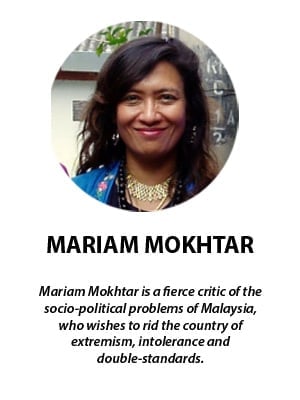FMT:
A mother and the burden of religion
If the events of Loh Siew Hong’s story occurred to a Malay-Muslim woman, how would Malaysians, especially the Malay-Muslim community, react?

The story of single mother Loh Siew Hong is the story of a woman who is prepared to uphold her rights and that of her children. It is also the story of a woman who is prepared to challenge two powerful institutions: one is the state religious authority, while the other is the establishment.
No mother should have to go through Loh’s traumatic experience.
Her three children were allegedly kidnapped by her former husband, their whereabouts unknown; by the time she traced them to a location in Perlis, she discovered that the children had been converted without her permission.
Her Hindu husband claimed that he converted because his children had persuaded him to do so.
On May 11, the High Court ruled against her and said that the unilateral conversion of her three children to Islam by her former husband had been done according to the legal requirements of the state of Perlis.
The judge, Ahmad Farid Wan Salleh, ruled that the children had willingly recited the kalimah syahadah (Islamic recitation to convert to Islam) in 2020.
An affidavit by Nazim Noo, chief executive of the Perlis Islamic Religious and Malay Customs Council, stated that the children were still practising Islam in February 2022, performing the dawn prayer every day, and that one of the children had expressed a desire to be a shariah lawyer.
Why did the judge fail to take note of the Federal Court’s decision against unilateral conversions? Was this not the key issue?
Questioning children is a very delicate matter and the presence of social workers who work with children is crucial.
Children are very impressionable and easily influenced, especially by people in authority. They may not say what they feel, but they may give the adult the answers they think the adult wants to hear.
Loh’s nightmare started before 2019. She was a victim of domestic abuse and her husband’s infidelity. Following her divorce, she applied to the courts to have custody of their children and was successful.
Instead of her rights and her childrens’ rights being exercised, Loh and her three children ended up being the victims.
Loh’s twin daughters were 11 years old and her son was eight when they were converted. They are now 14 and 11.
It is incredible that a lot of trust and faith had been placed on the children’s judgement. Cast your mind back to when you were eight or 11. What did you know about faith at that age?
The judge seemed to think that the children were willing participants in this conversion. He even treated them as adults all because they recited the kalimah shahadah, performed the dawn prayers, and one had expressed a desire to be a shariah lawyer. At such an age, when even people in their thirties do not know what they want out of life.
In Malaysia, teenagers are allowed to vote at 18. They are not allowed to apply for a credit card till they are 21. They can apply for a motorcycle licence at 16, or a motor car licence at 17. If they’re Muslim, they cannot get married below the age of 16, unless their parents apply to the shariah courts or to the menteri besar for permission to marry.
However, the judge in Loh’s case appears to accept that children at eight and 11 years of age are capable of taking on the burden of religion on their little shoulders.
Little or no mention was made of how the children were converted in the absence of their mother. In Malaysia, the Federal Court has held that it is unlawful to convert children to Islam without the consent of both parents.
The fact that Loh, the custodial parent, had not been present, nor had her permission been sought for the conversion, seemed to have been ignored.
The court ruled that the conversion was legal by Perlis’ standards.
Why are shariah laws not standardised? How can the same shariah law have a different interpretation in the different states? Shouldn’t they all be standardised? What about the Federal Court decision?
If some Malaysians fail to see the argument about unilateral conversions, then they should try and put themselves in the shoes of a fictitious mother, whom we shall call Fatimah, a Malay and a Muslim.
Let’s say that Fatimah’s marriage has failed and, for argument’s sake, let’s assume that, after their divorce, her former husband reverted to his original religion, which is Christianity.
Soon after she is granted custody of their children, her former husband then kidnaps their children and converts them to Christianity. He does this without Fatimah’s permission.
How do you think Malaysians, especially the Malay and Muslim community, will react?
So is it fair, or right, that Loh and her children have experienced such trauma?
No comments:
Post a Comment